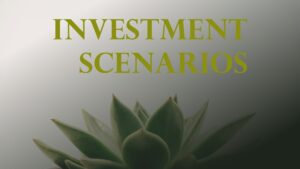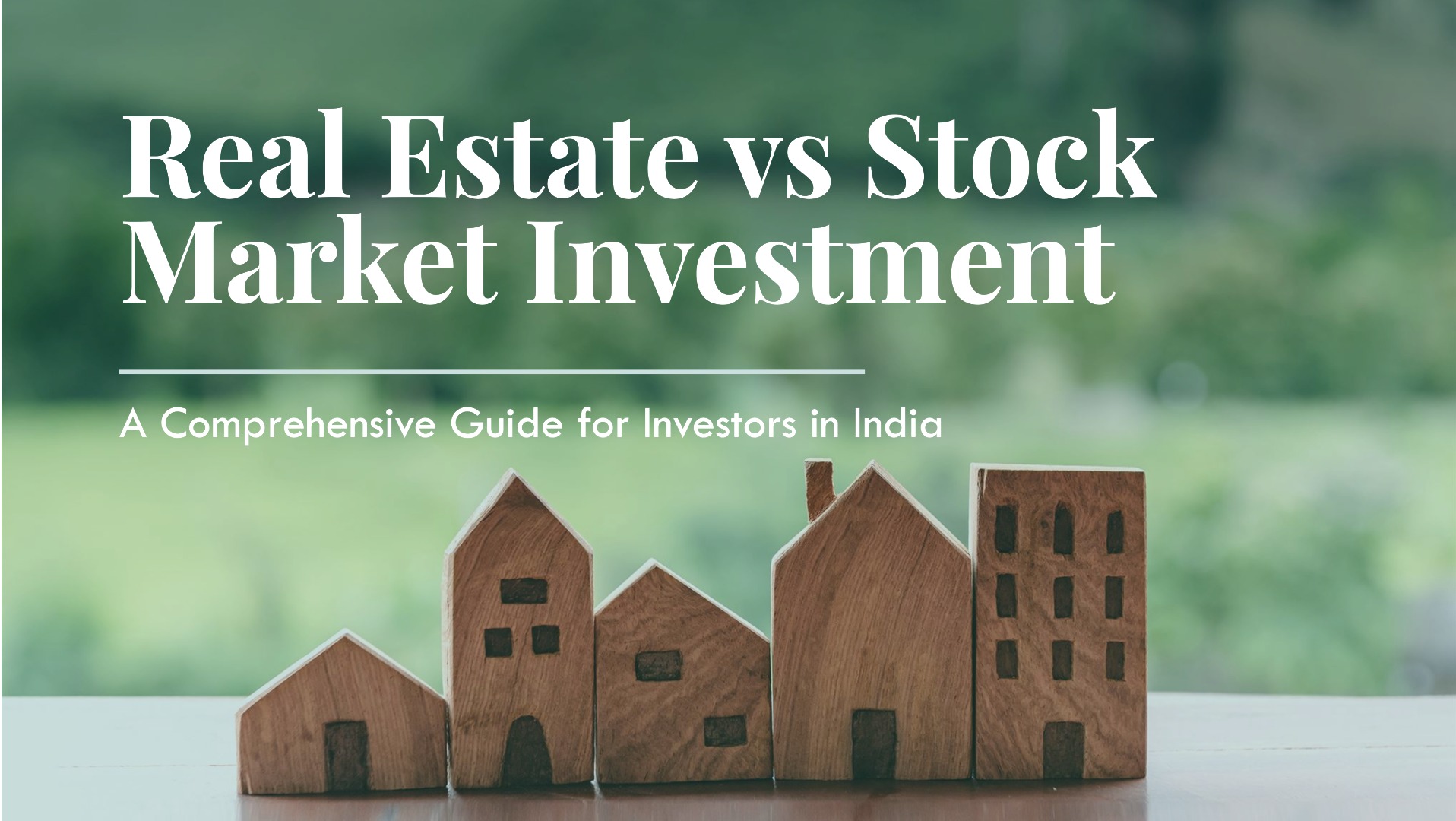When it comes to building wealth, two of the most prominent investment avenues in India are real estate and the stock market. Both options have their unique advantages, risks, and nuances that cater to different types of investors. Choosing the right path often depends on individual financial goals, risk tolerance, and market knowledge. This blog aims to provide an in-depth comparison of real estate and stock market investments to help you make an informed decision.
1. Understanding Real Estate Investment
Real estate investment involves purchasing property—whether residential, commercial, or land—with the intent of earning returns through rental income, resale value, or both. Here are the key aspects of real estate investment:

Advantages:
A. Tangible Asset
Real estate is a physical asset that you can see and touch, offering a sense of security to many investors.
B. Regular Income
Rental income from residential or commercial properties can provide a steady cash flow.
C. Hedge Against Inflation
Property values generally appreciate over time, often outpacing inflation.
D. Leverage
Investors can use loans to finance real estate purchases, allowing them to control a more significant asset with less initial capital.
Disadvantages:
A. High Initial Investment
Real estate requires substantial upfront costs, including down payments, registration fees, and maintenance.
B. Illiquidity
Properties cannot be quickly sold, making real estate less liquid than other investment options.
C. Market Dependency
Property prices are influenced by factors such as location, infrastructure development, and market conditions.
D. Ongoing Costs
Maintenance, property taxes, and loan EMIs add to the long-term expenses.
2. Understanding Stock Market Investment
Stock market investment involves buying shares of publicly traded companies with the aim of earning dividends or capital gains. Let’s explore the pros and cons:

Advantages:
A. High Liquidity
Stocks can be easily bought and sold on exchanges, making them highly liquid.
B. Low Entry Barrier
You can start investing in stocks with a minimal amount, making it accessible for small investors.
C. Diversification
Investors can spread their capital across various sectors, reducing risk.
D. Potential for High Returns
Over the long term, stock markets often yield higher returns compared to other asset classes.
Disadvantages:
A. Volatility
Stock prices are subject to market fluctuations, which can lead to significant losses.
B. Requires Knowledge
Successful stock investing demands an understanding of financial markets, company fundamentals, and macroeconomic factors.
C. Emotional Decision-Making
Investors may act irrationally during market highs and lows, impacting returns.
D. No Tangible Asset
Unlike real estate, stocks are intangible and may feel less secure for conservative investors.
Also Read: Stock Market Investing: A Comprehensive Guide
3. Comparing Real Estate and Stock Market Investments

A. Risk and Returns
- Real Estate: Relatively stable but yields moderate returns over the long term. However, specific markets can experience sharp appreciation or depreciation.
- Stock Market: High risk due to volatility but offers the potential for substantial returns if invested wisely.
B. Liquidity
- Real Estate: Low liquidity as selling a property is time-consuming and dependent on market conditions.
- Stock Market: High liquidity since shares can be traded almost instantly.
C. Time and Effort
- Real Estate: Requires significant effort in property maintenance, dealing with tenants, and understanding local markets.
- Stock Market: Demands research and monitoring but can be automated through mutual funds or robo-advisors.
D. Tax Benefits
- Real Estate: Tax deductions on home loan interest, principal repayment, and capital gains reinvestment under certain conditions.
- Stock Market: Taxation on gains depends on holding duration—short-term or long-term capital gains tax applies.
E. Inflation Hedge
- Real Estate: Typically serves as a good hedge against inflation.
- Stock Market: Certain sectors, like commodities or energy, can also act as inflation hedges.
4. Investment Scenarios: Which One is Right for You?

A. Real Estate is Better If:
- You seek long-term stability and tangible assets.
- You want to generate rental income.
- You’re willing to manage property-related tasks.
B. Stock Market is Better If:
- You prefer high liquidity and quick access to your funds.
- You’re comfortable with market fluctuations.
- You want to diversify your portfolio with a small initial investment.
5. Hybrid Approach: The Best of Both Worlds
For many investors, a balanced portfolio that includes both real estate and stocks can offer the best of both worlds. Real estate provides stability and tangible assets, while stocks offer growth and liquidity. This diversified approach reduces overall risk and aligns with various financial goals.
6. Real-Life Example
Case Study 1: Real Estate Investor
Ravi, a 40-year-old businessman, invested in a residential property in Bengaluru five years ago. He earns ₹50,000 monthly in rental income and recently sold another property for a 40% profit. While he’s happy with the returns, he finds property management time-consuming.
Case Study 2: Stock Market Investor
Priya, a 30-year-old IT professional, started investing in mutual funds and direct equities three years ago. Her portfolio has grown by 25% annually, and she enjoys the flexibility of reallocating funds quickly. However, she faced significant stress during market downturns.
7. Conclusion: The Verdict
Real estate and stock market investments each have their unique advantages and challenges. The right choice depends on your financial goals, risk appetite, and time commitment. If you’re looking for stability and tangible assets, real estate may be your go-to option. On the other hand, if you’re seeking liquidity and higher growth potential, the stock market could be more suitable.
Ultimately, a diversified investment strategy that leverages both avenues can help you maximize returns while mitigating risks. Take the time to evaluate your financial situation, consult with experts if needed, and invest wisely to secure a prosperous future.

